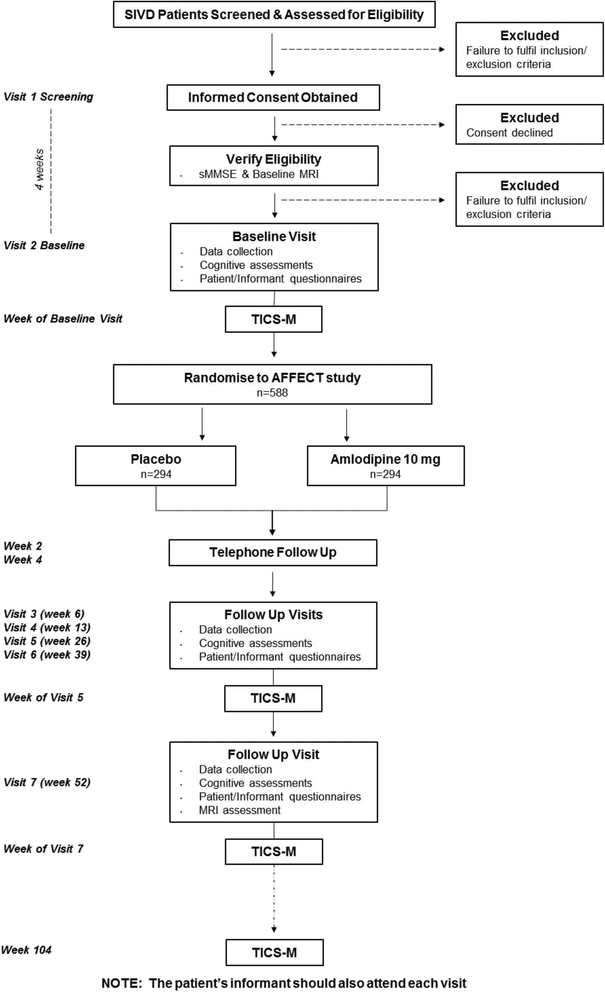A randomised controlled trial of calcium channel blockade (CCB) with Amlodipine For the treatment oF subcortical ischaEmic vasCular demenTia (AFFECT): study protocol
- PMID: 27430267
- PMCID: PMC4950108
- DOI: 10.1186/s13063-016-1449-3
A randomised controlled trial of calcium channel blockade (CCB) with Amlodipine For the treatment oF subcortical ischaEmic vasCular demenTia (AFFECT): study protocol
Abstract
Background: Vascular dementia is the second most common cause of dementia affecting over seven million people worldwide, yet there are no licensed treatments. There is an urgent need for a clinical trial in this patient group. Subcortical ischaemic vascular dementia is the most common variant of vascular dementia. This randomised trial will investigate whether use of calcium channel blockade with amlodipine, a commonly used agent, can provide the first evidence-based pharmacological treatment for subcortical ischaemic vascular dementia.
Methods/design: This is a randomised controlled trial of calcium channel blockade with Amlodipine For the treatment oF subcortical ischaEmic vasCular demenTia (AFFECT) to test the hypothesis that treatment with amlodipine can improve outcomes for these patients in a phase IIb, multi-centre, double-blind, placebo-controlled randomised trial. The primary outcome is the change from baseline to 12 months in the Vascular Dementia Assessment Scale cognitive subscale (VADAS-cog). Secondary outcomes include cognitive function, executive function, clinical global impression of change, change in blood pressure, quantitative evaluation of lesion accrual based on magnetic resonance imaging (MRI), health-related quality of life, activities of daily living, non-cognitive dementia symptoms, care-giver burden and care-giver health-related quality of life, cost-effectiveness and institutionalisation. A total of 588 patients will be randomised in a 1:1 ratio to either amlodipine or placebo, recruited from sites across the UK and enrolled in the trial for 104 weeks.
Discussion: There are no treatments licensed for vascular dementia. The most common subtype is subcortical ischaemic vascular dementia (SIVD). This study is designed to investigate whether amlodipine can produce benefits compared to placebo in established SIVD. It is estimated that the numbers of people with VaD and SIVD will increase globally in the future and the results of this study should inform important treatment decisions.
Trial registration: Current Controlled Trials ISRCTN31208535 . Registered on 7 March 2014.
Keywords: Amlodipine; Calcium channel blockade; Cognitive outcome; Subcortical ischaemic vascular dementia; Vascular dementia.
References
-
- Alzheimer’s Disease International. World Alzheimer’s Report 2010. The Global Economic Impact of Dementia. London: Alzheimer’s Disease International; 2010.
-
- Malouf R, Birks J. Donepezil for vascular cognitive impairment. Cochrane Database Syst Rev. 2004;1:CD004395. - PubMed
-
- O’Brien JT, Erkinjuntti T, Reisberg B, Roman G, Sawada T, Pantoni L, Bowler JV, Ballard C, DeCarli C, Gorelick PB, Rockwood K, Burns A, Gauthier S, DeKosky ST. Vascular cognitive impairment. Lancet Neurol. 2003;2:89–98. - PubMed
Publication types
MeSH terms
Substances
Associated data
Grants and funding
LinkOut - more resources
Full Text Sources
Other Literature Sources
Research Materials


